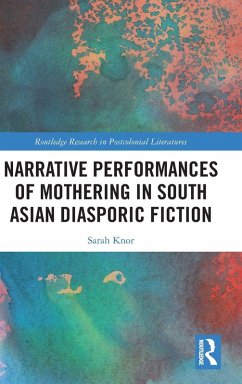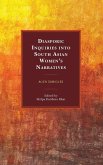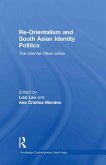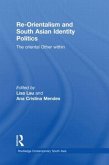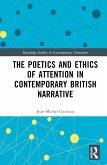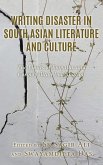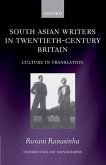Sarah Knor
Narrative Performances of Mothering in South Asian Diasporic Fiction
Sarah Knor
Narrative Performances of Mothering in South Asian Diasporic Fiction
- Gebundenes Buch
- Merkliste
- Auf die Merkliste
- Bewerten Bewerten
- Teilen
- Produkt teilen
- Produkterinnerung
- Produkterinnerung
Examining a range of South Asian Anglophone diasporic novels and poetry, this monograph opens a new dialogue between diaspora studies and gender studies, arguing that discourses of diaspora benefit from re-examining their own critical relation to concepts of the maternal and the motherland.
Andere Kunden interessierten sich auch für
![Diasporic Inquiries into South Asian Women's Narratives Diasporic Inquiries into South Asian Women's Narratives]() Diasporic Inquiries into South Asian Women's Narratives103,99 €
Diasporic Inquiries into South Asian Women's Narratives103,99 €![Music and Identity in Postcolonial British South-Asian Literature Music and Identity in Postcolonial British South-Asian Literature]() Christin HoeneMusic and Identity in Postcolonial British South-Asian Literature182,99 €
Christin HoeneMusic and Identity in Postcolonial British South-Asian Literature182,99 €![Re-Orientalism and South Asian Identity Politics Re-Orientalism and South Asian Identity Politics]() Re-Orientalism and South Asian Identity Politics188,99 €
Re-Orientalism and South Asian Identity Politics188,99 €![Re-Orientalism and South Asian Identity Politics Re-Orientalism and South Asian Identity Politics]() Re-Orientalism and South Asian Identity Politics58,99 €
Re-Orientalism and South Asian Identity Politics58,99 €![The Poetics and Ethics of Attention in Contemporary British Narrative The Poetics and Ethics of Attention in Contemporary British Narrative]() Jean-Michel GanteauThe Poetics and Ethics of Attention in Contemporary British Narrative150,99 €
Jean-Michel GanteauThe Poetics and Ethics of Attention in Contemporary British Narrative150,99 €![Writing Disaster in South Asian Literature and Culture Writing Disaster in South Asian Literature and Culture]() Writing Disaster in South Asian Literature and Culture97,99 €
Writing Disaster in South Asian Literature and Culture97,99 €![South Asian Writers in Twentieth-Century Britain South Asian Writers in Twentieth-Century Britain]() Ruvani RanasinhaSouth Asian Writers in Twentieth-Century Britain156,99 €
Ruvani RanasinhaSouth Asian Writers in Twentieth-Century Britain156,99 €-
-
-
Examining a range of South Asian Anglophone diasporic novels and poetry, this monograph opens a new dialogue between diaspora studies and gender studies, arguing that discourses of diaspora benefit from re-examining their own critical relation to concepts of the maternal and the motherland.
Produktdetails
- Produktdetails
- Verlag: Routledge
- Seitenzahl: 232
- Erscheinungstermin: 30. Dezember 2022
- Englisch
- Abmessung: 235mm x 157mm x 17mm
- Gewicht: 493g
- ISBN-13: 9781032420479
- ISBN-10: 1032420472
- Artikelnr.: 65927839
- Herstellerkennzeichnung
- Libri GmbH
- Europaallee 1
- 36244 Bad Hersfeld
- gpsr@libri.de
- Verlag: Routledge
- Seitenzahl: 232
- Erscheinungstermin: 30. Dezember 2022
- Englisch
- Abmessung: 235mm x 157mm x 17mm
- Gewicht: 493g
- ISBN-13: 9781032420479
- ISBN-10: 1032420472
- Artikelnr.: 65927839
- Herstellerkennzeichnung
- Libri GmbH
- Europaallee 1
- 36244 Bad Hersfeld
- gpsr@libri.de
Dr. Sarah Knor is a lecturer and researcher in English literature, specialising in postcolonial and diasporic writing. She studied at the Ludwig-Maximilians-University, Munich and at Royal Holloway College, University of London. Her doctoral project was part of the international Marie Curie initial training network on "Diasporic Constructions of Home and Belonging" (Cohab) involving the universities of Münster, Oxford, SOAS, Mumbai, Stockholm and Northampton.
Acknowledgements
Abbreviations
1. Introduction: more than one mother
1.1 Gender and nation
1.2 Theories of the maternal
1.3 Theories of diaspora
1.4 Outline of chapters
2. Historical performances: reading Mother India in nationalist discourse
and Kipling
2.1 Bharat Mata
2.1.1 Vande Mataram
2.1.2 The mother-as-metaphor
2.1.3 Condensation and transaction
2.1.4 Metaphorical performances
2.2 Kipling's imperial Mother India
2.2.1 Imperial doublings
2.2.2 The native-born diaspora
3. Citational performances: "Talking major mother country" in Rushdie's
Midnight's Children
3.1 Diasporic maternal practices
3.2 Victorian Mothers
3.3 The performance of mothering
3.4 'De-condensing' Mother India
3.5 Diasporic bastards
4. Exile performances: Pakistani mother-daughter relationships in Bapsi
Sidhwa's
Cracking India and Sara Suleri's Meatless Days.
4.1 Sidhwa's matricide
4.1.1 Allegorical readings
4.1.2 Hired Mother India
4.2 Suleri's mother elegy
4.2.1 A poetics of unbelonging
4.2.2 Mother(ing)land
4.2.3 Performances of abjection
5. Maternal performances: mother tongues in Ravinder Randhawa's A Wicked
Old
Woman and Monica Ali's Brick Lane
5.1 Performing the mother tongue
5.2 A wicked old mother
5.3 Herethics and diasporic mothering
5.4 Diasporic seas
5.5 Ali's coming-of-agency
6. Outlook and conclusion: diasporic maternal aesthetics
6.1 Indo-Caribbean labours
6.2 Retrospects and prospects
7. Appendix
8. Works cited
9. Index
Abbreviations
1. Introduction: more than one mother
1.1 Gender and nation
1.2 Theories of the maternal
1.3 Theories of diaspora
1.4 Outline of chapters
2. Historical performances: reading Mother India in nationalist discourse
and Kipling
2.1 Bharat Mata
2.1.1 Vande Mataram
2.1.2 The mother-as-metaphor
2.1.3 Condensation and transaction
2.1.4 Metaphorical performances
2.2 Kipling's imperial Mother India
2.2.1 Imperial doublings
2.2.2 The native-born diaspora
3. Citational performances: "Talking major mother country" in Rushdie's
Midnight's Children
3.1 Diasporic maternal practices
3.2 Victorian Mothers
3.3 The performance of mothering
3.4 'De-condensing' Mother India
3.5 Diasporic bastards
4. Exile performances: Pakistani mother-daughter relationships in Bapsi
Sidhwa's
Cracking India and Sara Suleri's Meatless Days.
4.1 Sidhwa's matricide
4.1.1 Allegorical readings
4.1.2 Hired Mother India
4.2 Suleri's mother elegy
4.2.1 A poetics of unbelonging
4.2.2 Mother(ing)land
4.2.3 Performances of abjection
5. Maternal performances: mother tongues in Ravinder Randhawa's A Wicked
Old
Woman and Monica Ali's Brick Lane
5.1 Performing the mother tongue
5.2 A wicked old mother
5.3 Herethics and diasporic mothering
5.4 Diasporic seas
5.5 Ali's coming-of-agency
6. Outlook and conclusion: diasporic maternal aesthetics
6.1 Indo-Caribbean labours
6.2 Retrospects and prospects
7. Appendix
8. Works cited
9. Index
Acknowledgements
Abbreviations
1. Introduction: more than one mother
1.1 Gender and nation
1.2 Theories of the maternal
1.3 Theories of diaspora
1.4 Outline of chapters
2. Historical performances: reading Mother India in nationalist discourse and Kipling
2.1 Bharat Mata
2.1.1 Vande Mataram
2.1.2 The mother-as-metaphor
2.1.3 Condensation and transaction
2.1.4 Metaphorical performances
2.2 Kipling's imperial Mother India
2.2.1 Imperial doublings
2.2.2 The native-born diaspora
3. Citational performances: "Talking major mother country" in Rushdie's Midnight's Children
3.1 Diasporic maternal practices
3.2 Victorian Mothers
3.3 The performance of mothering
3.4 'De-condensing' Mother India
3.5 Diasporic bastards
4. Exile performances: Pakistani mother-daughter relationships in Bapsi Sidhwa's
Cracking India and Sara Suleri's Meatless Days.
4.1 Sidhwa's matricide
4.1.1 Allegorical readings
4.1.2 Hired Mother India
4.2 Suleri's mother elegy
4.2.1 A poetics of unbelonging
4.2.2 Mother(ing)land
4.2.3 Performances of abjection
5. Maternal performances: mother tongues in Ravinder Randhawa's A Wicked Old
Woman and Monica Ali's Brick Lane
5.1 Performing the mother tongue
5.2 A wicked old mother
5.3 Herethics and diasporic mothering
5.4 Diasporic seas
5.5 Ali's coming-of-agency
6. Outlook and conclusion: diasporic maternal aesthetics
6.1 Indo-Caribbean labours
6.2 Retrospects and prospects
7. Appendix
8. Works cited
9. Index
Abbreviations
1. Introduction: more than one mother
1.1 Gender and nation
1.2 Theories of the maternal
1.3 Theories of diaspora
1.4 Outline of chapters
2. Historical performances: reading Mother India in nationalist discourse and Kipling
2.1 Bharat Mata
2.1.1 Vande Mataram
2.1.2 The mother-as-metaphor
2.1.3 Condensation and transaction
2.1.4 Metaphorical performances
2.2 Kipling's imperial Mother India
2.2.1 Imperial doublings
2.2.2 The native-born diaspora
3. Citational performances: "Talking major mother country" in Rushdie's Midnight's Children
3.1 Diasporic maternal practices
3.2 Victorian Mothers
3.3 The performance of mothering
3.4 'De-condensing' Mother India
3.5 Diasporic bastards
4. Exile performances: Pakistani mother-daughter relationships in Bapsi Sidhwa's
Cracking India and Sara Suleri's Meatless Days.
4.1 Sidhwa's matricide
4.1.1 Allegorical readings
4.1.2 Hired Mother India
4.2 Suleri's mother elegy
4.2.1 A poetics of unbelonging
4.2.2 Mother(ing)land
4.2.3 Performances of abjection
5. Maternal performances: mother tongues in Ravinder Randhawa's A Wicked Old
Woman and Monica Ali's Brick Lane
5.1 Performing the mother tongue
5.2 A wicked old mother
5.3 Herethics and diasporic mothering
5.4 Diasporic seas
5.5 Ali's coming-of-agency
6. Outlook and conclusion: diasporic maternal aesthetics
6.1 Indo-Caribbean labours
6.2 Retrospects and prospects
7. Appendix
8. Works cited
9. Index
Acknowledgements
Abbreviations
1. Introduction: more than one mother
1.1 Gender and nation
1.2 Theories of the maternal
1.3 Theories of diaspora
1.4 Outline of chapters
2. Historical performances: reading Mother India in nationalist discourse
and Kipling
2.1 Bharat Mata
2.1.1 Vande Mataram
2.1.2 The mother-as-metaphor
2.1.3 Condensation and transaction
2.1.4 Metaphorical performances
2.2 Kipling's imperial Mother India
2.2.1 Imperial doublings
2.2.2 The native-born diaspora
3. Citational performances: "Talking major mother country" in Rushdie's
Midnight's Children
3.1 Diasporic maternal practices
3.2 Victorian Mothers
3.3 The performance of mothering
3.4 'De-condensing' Mother India
3.5 Diasporic bastards
4. Exile performances: Pakistani mother-daughter relationships in Bapsi
Sidhwa's
Cracking India and Sara Suleri's Meatless Days.
4.1 Sidhwa's matricide
4.1.1 Allegorical readings
4.1.2 Hired Mother India
4.2 Suleri's mother elegy
4.2.1 A poetics of unbelonging
4.2.2 Mother(ing)land
4.2.3 Performances of abjection
5. Maternal performances: mother tongues in Ravinder Randhawa's A Wicked
Old
Woman and Monica Ali's Brick Lane
5.1 Performing the mother tongue
5.2 A wicked old mother
5.3 Herethics and diasporic mothering
5.4 Diasporic seas
5.5 Ali's coming-of-agency
6. Outlook and conclusion: diasporic maternal aesthetics
6.1 Indo-Caribbean labours
6.2 Retrospects and prospects
7. Appendix
8. Works cited
9. Index
Abbreviations
1. Introduction: more than one mother
1.1 Gender and nation
1.2 Theories of the maternal
1.3 Theories of diaspora
1.4 Outline of chapters
2. Historical performances: reading Mother India in nationalist discourse
and Kipling
2.1 Bharat Mata
2.1.1 Vande Mataram
2.1.2 The mother-as-metaphor
2.1.3 Condensation and transaction
2.1.4 Metaphorical performances
2.2 Kipling's imperial Mother India
2.2.1 Imperial doublings
2.2.2 The native-born diaspora
3. Citational performances: "Talking major mother country" in Rushdie's
Midnight's Children
3.1 Diasporic maternal practices
3.2 Victorian Mothers
3.3 The performance of mothering
3.4 'De-condensing' Mother India
3.5 Diasporic bastards
4. Exile performances: Pakistani mother-daughter relationships in Bapsi
Sidhwa's
Cracking India and Sara Suleri's Meatless Days.
4.1 Sidhwa's matricide
4.1.1 Allegorical readings
4.1.2 Hired Mother India
4.2 Suleri's mother elegy
4.2.1 A poetics of unbelonging
4.2.2 Mother(ing)land
4.2.3 Performances of abjection
5. Maternal performances: mother tongues in Ravinder Randhawa's A Wicked
Old
Woman and Monica Ali's Brick Lane
5.1 Performing the mother tongue
5.2 A wicked old mother
5.3 Herethics and diasporic mothering
5.4 Diasporic seas
5.5 Ali's coming-of-agency
6. Outlook and conclusion: diasporic maternal aesthetics
6.1 Indo-Caribbean labours
6.2 Retrospects and prospects
7. Appendix
8. Works cited
9. Index
Acknowledgements
Abbreviations
1. Introduction: more than one mother
1.1 Gender and nation
1.2 Theories of the maternal
1.3 Theories of diaspora
1.4 Outline of chapters
2. Historical performances: reading Mother India in nationalist discourse and Kipling
2.1 Bharat Mata
2.1.1 Vande Mataram
2.1.2 The mother-as-metaphor
2.1.3 Condensation and transaction
2.1.4 Metaphorical performances
2.2 Kipling's imperial Mother India
2.2.1 Imperial doublings
2.2.2 The native-born diaspora
3. Citational performances: "Talking major mother country" in Rushdie's Midnight's Children
3.1 Diasporic maternal practices
3.2 Victorian Mothers
3.3 The performance of mothering
3.4 'De-condensing' Mother India
3.5 Diasporic bastards
4. Exile performances: Pakistani mother-daughter relationships in Bapsi Sidhwa's
Cracking India and Sara Suleri's Meatless Days.
4.1 Sidhwa's matricide
4.1.1 Allegorical readings
4.1.2 Hired Mother India
4.2 Suleri's mother elegy
4.2.1 A poetics of unbelonging
4.2.2 Mother(ing)land
4.2.3 Performances of abjection
5. Maternal performances: mother tongues in Ravinder Randhawa's A Wicked Old
Woman and Monica Ali's Brick Lane
5.1 Performing the mother tongue
5.2 A wicked old mother
5.3 Herethics and diasporic mothering
5.4 Diasporic seas
5.5 Ali's coming-of-agency
6. Outlook and conclusion: diasporic maternal aesthetics
6.1 Indo-Caribbean labours
6.2 Retrospects and prospects
7. Appendix
8. Works cited
9. Index
Abbreviations
1. Introduction: more than one mother
1.1 Gender and nation
1.2 Theories of the maternal
1.3 Theories of diaspora
1.4 Outline of chapters
2. Historical performances: reading Mother India in nationalist discourse and Kipling
2.1 Bharat Mata
2.1.1 Vande Mataram
2.1.2 The mother-as-metaphor
2.1.3 Condensation and transaction
2.1.4 Metaphorical performances
2.2 Kipling's imperial Mother India
2.2.1 Imperial doublings
2.2.2 The native-born diaspora
3. Citational performances: "Talking major mother country" in Rushdie's Midnight's Children
3.1 Diasporic maternal practices
3.2 Victorian Mothers
3.3 The performance of mothering
3.4 'De-condensing' Mother India
3.5 Diasporic bastards
4. Exile performances: Pakistani mother-daughter relationships in Bapsi Sidhwa's
Cracking India and Sara Suleri's Meatless Days.
4.1 Sidhwa's matricide
4.1.1 Allegorical readings
4.1.2 Hired Mother India
4.2 Suleri's mother elegy
4.2.1 A poetics of unbelonging
4.2.2 Mother(ing)land
4.2.3 Performances of abjection
5. Maternal performances: mother tongues in Ravinder Randhawa's A Wicked Old
Woman and Monica Ali's Brick Lane
5.1 Performing the mother tongue
5.2 A wicked old mother
5.3 Herethics and diasporic mothering
5.4 Diasporic seas
5.5 Ali's coming-of-agency
6. Outlook and conclusion: diasporic maternal aesthetics
6.1 Indo-Caribbean labours
6.2 Retrospects and prospects
7. Appendix
8. Works cited
9. Index

